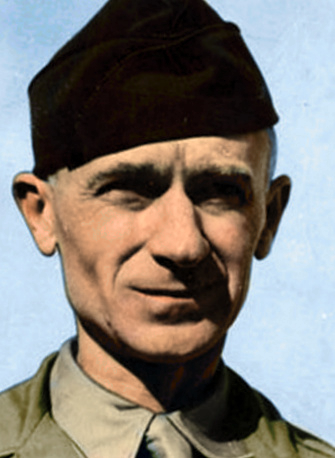The Pittsburgh Press (August 30, 1944)

Roving Reporter
By Ernie Pyle
Paris, France – (by wireless)
As we drove toward Paris from the south, hundreds of Parisians – refugees and returning vacationists – rode homeward on bicycles amidst the tanks and big guns.
Some Frenchmen have the facility for making all of us Nervous Nellies look ridiculous. There should be a nonchalant Frenchman in every war movie. He would be a sort of French Charlie Chaplin. You would have tense soldiers crouching in ditches and firing from behind low walls. And in the middle of it you would have this Frenchman, in faded blue overalls and beret and with a nearly burned-up cigarette in his mouth, come striding down the middle of the road past the soldiers.
I’ve seen that very thing happen about four times since D-Day, and you never can see it without laughing.
Well, the crowds were out in Paris like that while the shooting was still going on. People on bicycles would stop with one foot on the pavement to watch the firing that was going on right in that block.
As the French 2nd Armored Division rolled into the city at dangerous speed, I noticed one tank commander, with goggles, smoking a cigar, and another soldier in a truck playing a flute for his own amusement. There were also a good many pet dogs riding into the battle on top of tanks and trucks.
Amidst this fantastic Paris-ward battle traffic were people pushing baby carriages full of belongings, walking with suitcases, and riding bicycles so heavily loaded with gear that if they were to lay them down, they had to have help to lift them upright.
And in the midst of it was a tandem bicycle ridden by a man and a beautiful woman, both in bright blue shorts, just as though they were holidaying – which undoubtedly they were.
Each tank sort of social center
You never saw so many bicycles in your life as in Paris. And they rig up the funniest contraptions on them, such as little two-wheeled carts which they tow behind. And we saw a wagon rigged up so it could be pulled by two bicyclists riding side by side, like a team of horses.
For 24 hours tanks were parked on the sidewalks all over downtown Paris. They were all manned by French soldiers, and each tank immediately became a sort of social center.
Kids were all over the tanks like flies. Women in white dresses climbed up to kiss men with grimy faces. And early the second morning we saw a girl climbing sleepily out of a tank turret.
French soldiers of the Armored Division were all in American uniforms and they had American equipment. Consequently, most people at first thought we few Americans were French. Then, puzzled, they would say, “English?” and we would say, “No, American.” And then we would get a little scream and a couple more kisses.
Every place you stopped, somebody in the crowd could speak English. They apologized for not inviting us to their homes for a drink, saying they didn’t have any. Time and again they would say, “We’ve waited so long for you!” It almost got to be a refrain.
One elderly gentleman said that although we were long in reaching France we had come swiftly since then. He said the people hadn’t expected us to be in Paris for six months after invasion day.
There are not many American soldiers in Paris. And it’s unlikely there will be, at least for some time, because they are out over France going on with the war.
Paris was not a military objective; its liberation so soon was more of a symbol. That’s the reason the French Armored Division was assigned to the job.
Hotel life strange to Ernie
The armies still fighting in the field were practically deserted for a few days by the correspondents, as we all wanted to get in on the liberation of Paris. There were so many correspondents it got to be a joke, even among us. I think at least 200 must have entered the city that first day. both before and after the surrender.
The Army had picked out a hotel for us ahead of time, and it was taken over as soon as the city surrendered. But though it was a big hotel it was full before dark the first day, so they have taken over another huge one across the street.
Hotel life seems strange after so long in the field. My own room is a big corner one, with easy chairs, a soft bed, a bathroom and maid and hall-porter service. There is no electricity in the daytime, no hot water anytime and no restaurant or bar, but outside of that the hotel is just about like peacetime.
Sitting here writing within safe walls, and looking out the window occasionally at the street thronged with happy people, it is already hard to believe there was a war; even harder to realize there still is a war.


